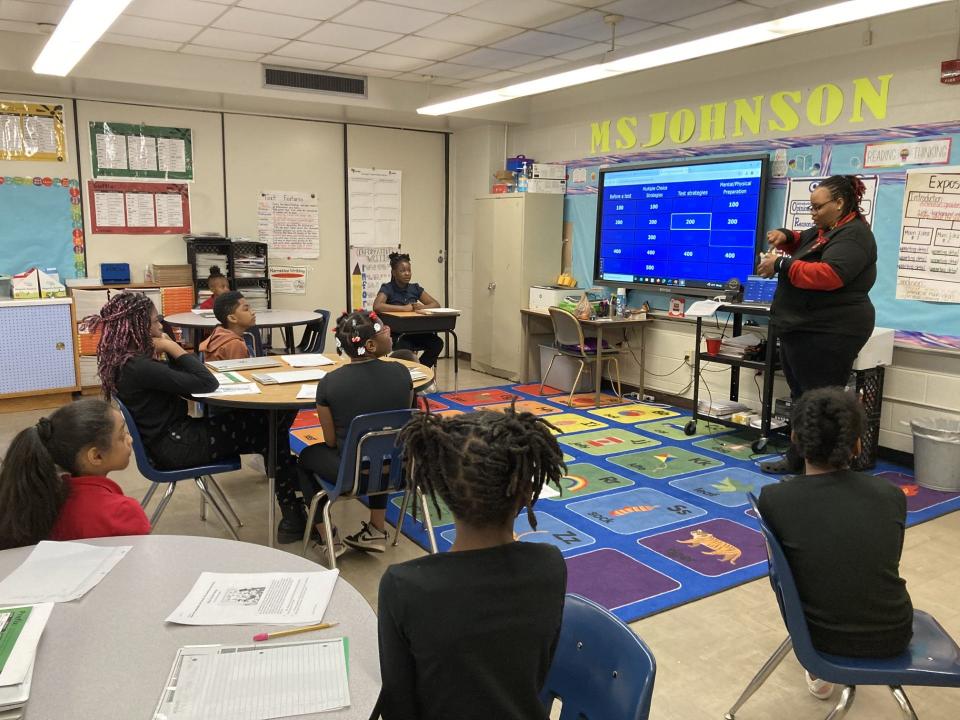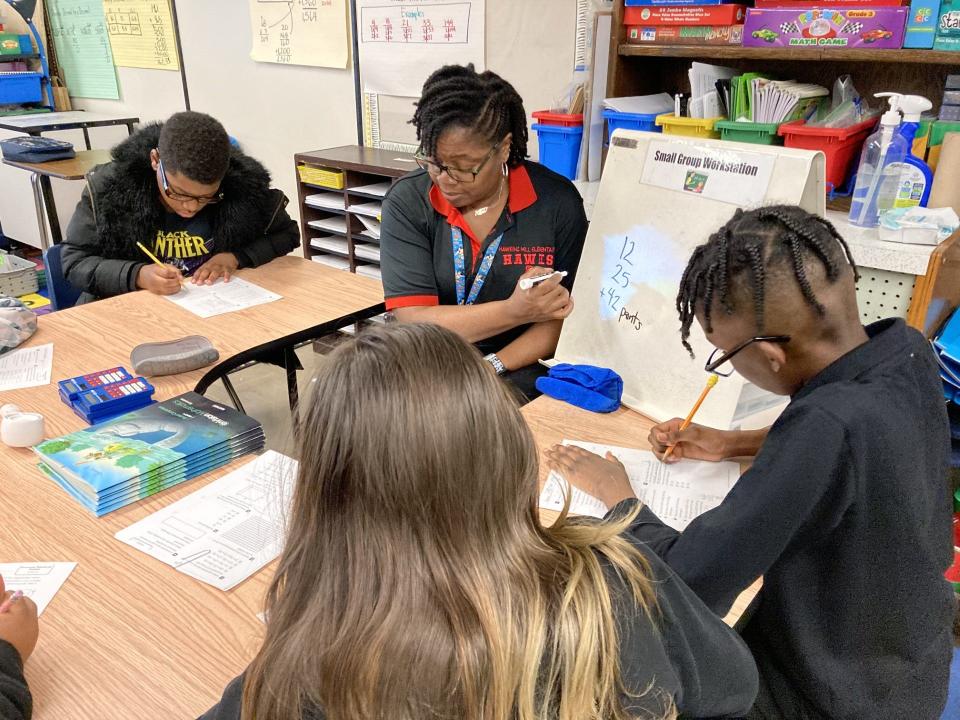All the talk is about TCAP. But this Memphis teacher teaches beyond the test
Once, near the end of the school day, Amanda Johnson told her students a tale about a princess in a castle. But this was no ordinary princess. She was, Johnson explained, “from the hood.” And though she initially didn’t think she’d succeed in life, she ultimately became a rich, powerful world leader.
Her students enjoyed the story, and it’s not the only one she’s shared with them. A third-grade teacher at Hawkins Mill Elementary, Johnson writes stories and reads them to her students, who crowd around her, listen intently, and ask, “What happened next, Mrs. Johnson?”
It’s one of the many ways she tries to strike a balance between teaching to the state-mandated tests that measure student performance, while still fostering a love of learning.
“I want them to think beyond the test,” she said. “l ask you a question; it may focus towards the test. But it's also making sure that you're pushing the limit.”
'Cannot stay silent': Memphis school leaders react to TN voucher bill's failure
More: Five MSCS school board seats are up for grabs in August. Here's who's running
Third-grade literacy
Johnson teaches third-grade English Language Arts, a subject and grade that have become increasingly high profile.
Third grade is the time when students have historically been expected to go from “learning to read” to "reading to learn.” After primarily reading to become a better reader, they begin using the skill to learn about a wide variety of things. If they can’t effectively read when they’re transitioning into the fourth grade, they can begin to fall behind in other subjects.
The state’s public school students’ reading levels are measured on the ELA section of the Tennessee Comprehensive Assessment Program tests, which began April 15. A proficient score implies a student is reading at grade level. Last year, 23.5% of third graders in Memphis-Shelby County Schools ― which Hawkins Mills is a part of ― scored proficiently on the ELA section.
The goal, this school year, is for that number to grow to 29%. At Hawkins Mills, 27% of third-grade students earned a proficient ELA score last year, and this go-round, the school’s target is for that number to reach 30% ― or eclipse it.

The stakes for third graders are high, as students who fall short of a proficient mark risk being held back, due to a statewide reading retention law that went into effect in 2023. Last year, it left 44,000 third graders throughout Tennessee at risk of being retained.
Just 898 of them were ultimately held back, thanks to tutoring options and other exemptions; but Johnson understands what’s on the table ― and so do her students.
When The Commercial Appeal asked Johnson when they started talking about TCAP, she said wryly, “When was the first day of school?”
She doesn’t constantly throw the “TCAP” acronym around, as it can make students even more nervous about the test. But she does explain the importance of it and tries to ensure they’re learning what they need to. If a student isn’t grasping something, she’ll work with them in a small group. She continuously keeps the students abreast of their scores on practice tests throughout the school year, so they can understand “where they are ― and where they need to be.”
“We, as teachers, look at the data,” she said. “But I want the students to see it.”
More: Superintendent for Memphis schools addresses possible job changes, federal funding cliff
'This is a whole other world'
As Johnson is keenly aware, however, teaching to the test and data sharing only goes so far.
She loves the subjects she teaches; she loves to read and write. She wants her students to be able to read effectively not so they can score well on a test, but so they can find joy and fulfillment in books.
So, Johnson teaches beyond the test. Because Hawkins Mills practices looping ― the process of having a teacher instruct the same class multiple years in a row ― she has had these students before and knows them well. She shares the stories she writes. She selects books that aren’t part of the curriculum and sends them to the library to select books of their own.

She’ll have them pick a fun book ― say, a comic book ― and one book that’s more informational. She has students explain to her why they chose the books. She’ll ask them open-ended questions that are less likely to be seen on a standardized test, ones she refers to as “higher-order thinking questions.”
She also shows her students just how much she loves to read.
“I don't watch TV. All I do is read, and I make sure I tell my students that,” Johnson explained. “On spring break, I read 15 books, and I showed them my reading and insight on Kindle. I said, ‘You see, I read 15 books. They said, ‘Ms. Johnson, why are you always reading?’ I said, ‘Let me tell you something. This is a whole other world. This is a whole other world that I go into, and it’s nothing that you can get on TV.’”
John Klyce covers education and children's issues for The Commercial Appeal. You can reach him at John.klyce@commercialappeal.com.
This article originally appeared on Memphis Commercial Appeal: How a Tennessee teacher pushes her students to learn beyond TCAP tests

